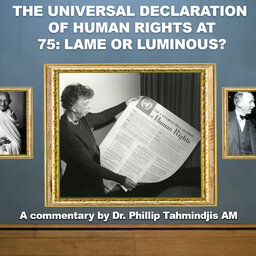The Universal Declaration of Human of Human Rights Today: Can it still be relevant in the 21st Century?
This episode considers the relevance of the Universal Declaration of Human Rights
today, in spite of the political compromises which surrounded its drafting, resulting in
ambiguous norms which rely on domestic legal systems for meaning as well as
effective implementation.
As the previous episodes have shown, impulses towards individual rights and
freedoms have always been conflicting and conflicted, and have never exhibited a
consistent, linear, upward development. Human dignity as expressed as rights to
freedom and equality has never been an immutable concept, and is not so now.
If so, how useful can the Declaration be today?
This episode focuses on three facts: the contribution of the Declaration to the
processes of human rights; its contribution to coping with today’s human rights
flashpoints; and its relevance in addressing new horizons in international law.
The episode contains further excerpts of the interview the presenter conducted with
John Humphrey, the Canadian scholar who constructed the initial draft of the
Declaration, as well as interviews with Ambassador Hans Corell (the former UN
Under-Secretary-General for Legal Affairs) and with the Hon Michael Kirby (former
Justice of the High Court of Australia).
 THE UNIVERSAL DECLARATION OF HUMAN RIGHTS AT 75: LAME OR LUMINOUS?
THE UNIVERSAL DECLARATION OF HUMAN RIGHTS AT 75: LAME OR LUMINOUS?


